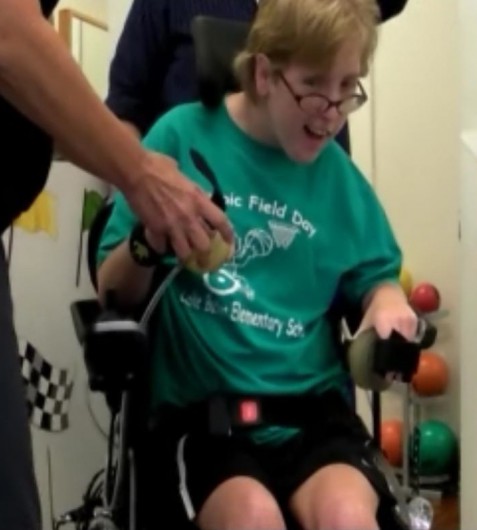NSU Newsroom
SharkBytes
Horizons
This version of NSU News has been archived as of February 28, 2019. To search through archived articles, visit nova.edu/search. To access the new version of NSU News, visit news.nova.edu.
This version of SharkBytes has been archived as of February 28, 2019. To search through archived articles, visit nova.edu/search. To access the new version of SharkBytes, visit sharkbytes.nova.edu.
Faculty Member in Occupational Therapy develops new Mobility Wheelchair
Sandra Winkler, Ph.D., OTR/L, assistant professor of Occupational Therapy in the College of Health Care Sciences, is the first named inventor on US Patent and Trademark Office Patent No. 8244655, titled, “Force-Sensing Orthotic Electric Device Controller” issued August 14, 2012.
 The purpose of the device is to provide independent mobility for individuals who are candidates for power mobility but whose impairments prevent them from operating commercial wheelchair controls. Most existing interfaces to power wheelchairs require either upper extremity control to use traditional proportional joysticks or discrete interfaces or head control such as head pointer or chin joystick. Our concept removes the control sensor (the joystick) from the wheelchair frame and attaches it to the body as a wearable device. In 2012, Winkler received a two-year R21 award (#7R21HD053526-02) from the Eunice Kennedy Shriver National Institute of Child Health & Human Development to establish proof of concept for the device. Winkler and her research team (Michael Rosen and Matt Christensen, research associate, from the University of Vermont and Sergio Romero from the University of Florida) named the device “SPOOCI” (Self-referenced Personal Orthotic Omni-purpose Control Interface) and pronounced “spooky” as an intentional reference to the near magical sight of an individual driving a power wheelchair without any visible externally referenced control interface.
The purpose of the device is to provide independent mobility for individuals who are candidates for power mobility but whose impairments prevent them from operating commercial wheelchair controls. Most existing interfaces to power wheelchairs require either upper extremity control to use traditional proportional joysticks or discrete interfaces or head control such as head pointer or chin joystick. Our concept removes the control sensor (the joystick) from the wheelchair frame and attaches it to the body as a wearable device. In 2012, Winkler received a two-year R21 award (#7R21HD053526-02) from the Eunice Kennedy Shriver National Institute of Child Health & Human Development to establish proof of concept for the device. Winkler and her research team (Michael Rosen and Matt Christensen, research associate, from the University of Vermont and Sergio Romero from the University of Florida) named the device “SPOOCI” (Self-referenced Personal Orthotic Omni-purpose Control Interface) and pronounced “spooky” as an intentional reference to the near magical sight of an individual driving a power wheelchair without any visible externally referenced control interface.
The next phase of this work will develop an online decision guide and selection menu from which clinicians can customize SPOOCI interfaces for individual clients.